I read recently— Maria Popova, I think— that the word animal is derived from the Latin word anima, meaning soul. I wrote it down. I thought of the animals I’ve been encountering lately (human ones included), or rather, the moments of holding their gaze. Eye contact that holds not politely, not incidentally, but with intention. Have you ever had that feeling after locking eyes with an animal that your soul is being stared into? At the wildlife preserve where I work, visitors often say they get this feeling. They say it feels like the animals are looking straight into them. Or through them. Like when the bison is close enough that you could touch him if you were foolish. He stands steadily and waits with molasses eyes and does not blink. There is no performance or apology or anxiety in his gaze. You can remember how long the earth has been spinning and you remember that you too are an animal.
The other day I was in the rehab centre. I was standing across from a great horned owl. Some call these birds the tigers of the sky. It was a small room, just the owl, Melissa from the care team, my coworker Britt (who captured the below video) and me. She hadn’t been there long and was still unsure of us, I imagine. We were watching Melissa feed her. Her eyes didn’t flinch and ours didn’t either. It was an unspoken mutual gaze, not affectionate, and not with recognition. But it was a moment of deep shared conscious exchange, of attention and curiosity. The feeling of staring into the soul of a being so different from ours. Animals often have the confidence and the audacity to stare right into us.
One night last summer while I was living in Vancouver I dreamt of a woman with bold teal eyeliner around her eyes. The next day I arrived at a farm for the weekend and met a woman named Nancy. She was wearing bold teal eyeliner. I thought the timing was funny and undeniable and by the end of the weekend I decided to tell her about the dream. Her eyes lit up as she told me that her eyeliner is permanently tattoo’d around her eyes, so how peculiar the dream indeed. She told me that day that eyes are windows to the soul. A quote credited to William Shakespeare, although no one can actually find that line in any of his works. Maybe it was just something he said at parties. I thought it was a beautiful sentiment— that maybe what’s sacred and invisible in us peeks out through our pupils and irises, like candlelight behind glass.
The most beautiful thing we can experience is the mysterious. It is the source of all true art and science.
— Albert Einstein
It’s pretty context dependent, but locking eyes and keeping a mutual gaze with another being we’ve just met can make us a little uneasy (and I know this is discussed a lot amongst neurodivergent people). It’s rude to stare and it’s uncomfortable if someone is gazing at you for too long. But it’s a powerful way to feel another’s soul, isn’t it? At least, so says William Shakespeare. We welcome other animals to stare at us, and feel honoured even. There’s a lot of discussion about soul out there and whether or not nonhuman life has it. As if we can see it or measure it and determine if beings other than ourselves have it. To me, it feels like animals often bare their souls immediately upon meeting, in a way that is refreshing. What happens when we bare our souls to each other right away? As humans we have to strip away quite a lot in order to do it. Self-consciousness, hesitation, social norms, the masks we wear for the world. To bare our souls we also have to allow silence when the moment calls for it, listen instead of determining how to respond, express exactly what we feel in the moment, and drop social scripts. It takes a lot to soul-strip in broad daylight.
The Anglo-Irish poet David Whyte often describes the soul as something deeply connected to our truest, most essential self. The part of us that seeks authenticity, depth, and connection with the larger world. I asked myself what soul means and jotted down the first things that came to mind. Here’s what came out:
soulful connection— seeing one another in our true essence
the look in someone’s eye when their full attention is on you and they are dying to hear what is inside of you
beauty and art that shuffles something inside, connecting your inner world to outer reality
standing outside in the cold late night taking in the aurora above my cabin in silence
intimate moments with self and others, feeling depth of emotion
honest moments where nothing feels hidden and masked
when laughter can’t be contained because the moment is too real and light and beautiful and you feel so alive
shared meaning and truth
the totality of a being
eye contact
losing “myself” (moreso, my surface understanding of self) in the flow
telling a story around a fire / writing by candlelight (so romantic)
This list in its entirety represents a few things to me: aliveness, spirit, feeling, and relationship between our inner and outer worlds, with ourselves and other living things.
There’s a book I’ve got on hold at the library that I’ve been dying to read called The Soul of an Octopus: A Surprising Exploration into the Wonder of Consciousness by Sy Montgomery. (There is also an incredibly moving documentary about an octopus called My Octopus Teacher. If you are in the mood for a visually stunning and emotional unfolding of a friendship between a human and an octopus. I was so moved that I made posters afterwards.) Anyway, Montgomery is known for her books exploring animal intelligence, consciousness, and human-animal relationships. There’s one quote in particular that I saved, where she wonders:
What is the soul? Some say it is the self, the “I” that inhabits the body; without the soul, the body is like a lightbulb with no electricity. But it is more than the engine of life, say others; it is what gives life meaning and purpose. Soul is the fingerprint of God.
Others say that soul is our innermost being, the thing that gives us our senses, our intelligence, our emotions, our desires, our will, our personality, and identity. One calls soul “the indwelling consciousness that watches the mind come and go, that watches the world pass.” Perhaps none of these definitions is true. Perhaps all of them are. But I am certain of one thing as I sit in my pew: If I have a soul — and I think I do — an octopus has a soul, too.
Animals seem to have a kind of soulfulness, in fact. I see them as fully inhabiting their existence, unburdened by the self-consciousness that we often face as humans. One of the most healing things about being around animals is that they don’t seem to be able to be anything other than what or who they are. They are not able to hide their themness. I suppose being able to choose to change ourselves as humans can be helpful when we want to grow and evolve in a direction. But I think that’s something different than who we are in our essence. I often find the advice “just be yourself” sounds lovely, but it’s kind of like telling a chameleon to choose a favourite colour (Trevor Noah is with me). Maybe some of you don’t feel you have as many versions of selves as I do. The version of me who frolics alone around the forest talking to moss in the morning is very different from the version who sits on Zoom with clients. Who is the self in a world where we constantly shift to fit different contexts?
One of our strangest skills is our ability to not be ourselves, to morph depending on who we’re with and what’s expected of us. Do other animals do this? The instinct to adapt and to shape oneself to circumstance is not uniquely human. Anthropologists will remind us that we are social primates, hardwired for belonging. Our instinct to adapt and shape-shift remains deeply ingrained. What is uniquely human, perhaps, is our depth of self-awareness and the feeling of dissonance it can cause. How we can completely internalize our roles and existentially perform versions of ourselves.
All the birds and creatures of the world are unutterably themselves. We seem to be the only part of creation that can refuse to be ourselves. We can get afraid of who we are, and temporarily put a mask on and pretend to be something else. Then we can forget that we were pretending, and become the person, on the surface at least, that we were pretending to be.
— David Whyte
Yuval Noah Harari, in his book Sapiens, argues that our deep insecurity as a species may stem from the fact that we climbed to the top of the food chain unnaturally fast. He writes:
Other animals at the top of the pyramid, such as lions and sharks, evolved into that position very gradually, over millions of years. This enabled the ecosystem to develop checks and balances that prevent lions and sharks from wreaking too much havoc. [...] In contrast, humankind ascended to the top so quickly that the ecosystem was not given time to adjust. Moreover, humans themselves failed to adjust. Most top predators of the planet are majestic creatures. Millions of years of dominion have filled them with self-confidence. Sapiens by contrast is more like a banana republic dictator. Having so recently been one of the underdogs of the savannah, we are full of fears and anxieties over our position, which makes us doubly cruel and dangerous.
I don’t want to linger too long on analyzing our strange flaws and insecurities as a species (I think we need to strike a good balance, like anything, between critical self-awareness and self-acceptance/love). It might be one of the greatest honours in the universe to get to experience all that comes with being a human creature. But I enjoyed Harari’s comparisons. It’s fun to hang around other animals and notice how they don’t seem to question their authenticity and existence quite as much. They remind me what it means to exist without too much hesitation. I enjoy the moments when I can remember this.

If I have a soul, can a moth have a soul?
I’m not sure if this story will be interesting to anyone else but it is special to me and this is my blog so, I am going to tell it. A couple months ago, a beautiful yellow-green moth appeared in my cabin. When I first saw her I thought, this is the most gorgeous moth I have ever seen. It was about -20 degrees celsius that day so I can’t imagine that she came from outside. But I am not an expert on where moths come from. I can’t remember exactly what I was feeling, but I was having one of those nights where you forget just how wonderful your life is. It had temporarily slipped my mind how many of my dreams had come true as of late. How many of my recent longings had been handed to me like fresh strawberries served on a platter sprinkled with brown sugar. One moment I was sitting in my bed feeling sorry for myself, and the next moment a lovely moth was flying around my face. She intimately landed on my ear and it felt to me that she had a soul and spirit of her own.
For some reason, I thought a lot about my late Aunt Vivian during the moth visit that night. I felt very comforted with whatever the thoughts were. It changed my whole night around. Viv died in 2018 and was someone who meant and means a great deal to me. She was my dad’s little sister and they were so deeply fond of each other. Her laugh and charming ability to switch from serious conversation into a dramatic Jewish American accent in the same breath replays in my mind. On our drive up to the Yukon, my dad said I sometimes remind him of her in my way of being. He said something about my lightness and some of my mannerisms. I told my Uncle John this (Viv’s husband) a few months ago and he said I also remind him of Viv in many ways, but more than anything in our “shared, beautiful, adventurous spirit.” This made me just a little emotional. I read a journal entry today from last year where I wrote, I feel a lot of comfort about my own life when I remember Viv and her life. Did she also have a little voice asking her to take her places and change her life when she left Toronto and moved to the North? I found out some of John and Viv’s friends in their town of Athabasca call me “little Vivian”.
There is an extensive amount of folklore that describes feelings of deceased loved ones appearing in the form of moths, I have since discovered. I notice I feel the need to state here that it’s not really my belief that the moth was my aunt Viv back from the dead. I probably only feel the need to state this out of fear of what the hyperlogical people may think, who I’d prefer not to give a damn about. My coworker recently asked if I believe in afterlife. I said I have a hard time defining what my belief is because what comes before and after my life is a complete mystery. So I’m resistant to have much of an opinion. But I do believe in soul and spirit and that we don’t really know how the universe and consciousness function, independently or collectively. I find life more amusing and beautiful when we flirt with mysticism. Anyway, the point of this story is not really to question afterlife, but to reveal that meaning shows up in ways we can’t always explain.
Back to the moth. The moth stayed perched on my wooden wall right above my pillow all night, and came back every night for the next three nights. I dove deep into moth research and videos that week (if you are going to consume any resource I share today, please watch this video of 7 gorgeous moths flying in slow motion). I learned that moths are one of the oldest known insect groups, with a long evolutionary history. Some fossils have indicated that they’ve been around at least 200 million years, meaning they lived during the time of dinosaurs! I did a drawing of the moth in my sketchbook and wrote out a quote that felt fitting:
We need another and a wiser and perhaps a more mystical concept of animals, for they are gifted with extensions of the senses we have lost or never attained, living by voices we shall never hear.
— Henry Beston
(American naturalist and writer from the late 1800s.)
I eventually found the moth dead under my side table, so I morbidly taped her to this page in my sketchbook. Now, here’s where the story feels especially special for me. The day that I wrote that quote down in my sketchbook, I texted Eve. Eve is the best friend of my Uncle John, who like I said, is the husband of my late aunt Viv. I was sending my condolences to Eve because I heard that she had to put down her beloved elderly horse Sir, and Sir’s best friend Lizzie the pony. Sir and Lizzie were quite the pair, a kind of soulmate friendship obvious to anyone who spent time with them. I had spent a couple days with the two animals and Eve last summer, and they, along with Uncle John and Aunt Viv, all played a part in my move up to the Yukon. After meeting her horses, I gently stroked my hand on one of their faces, and Eve said to me, “You’ve missed your calling in life, honey.” She said I had the kind of demeanour needed to work with animals. It was three weeks later that I made my way up to the Yukon and learned that the Yukon Wildlife Preserve was hiring.
Eve responded to the condolences text I sent her with a quote. It was a quote that Uncle John had apparently sent her earlier that day. My initial reaction was confusion upon receiving this text, a quote being passed to me through Eve from Uncle John. Confusion because it was the exact Henry Beston quote that I had just written down in my sketchbook page. The page dedicated to the moth who’s spirit made me think of Uncle John’s beloved, beautiful, inspiring, deeply spiritual, now gone wife, Vivian. In that moment and still now, I think about how sometimes coincidence and synchronicities feel like some nonverbal language more meaningful and delicious than our words could ever hope to be. I think Henry Beston was right in that we do need a wiser, more mystical concept of animals. Maybe we need a wiser, more mystical concept of everything.
The most beautiful thing we can experience is the mysterious.
Sticky note animation - behind the scenes
If you are curious how I made the animation for this newsletter, I used a bunch of sticky notes and frame-by-frame illustrations. A very fun process.
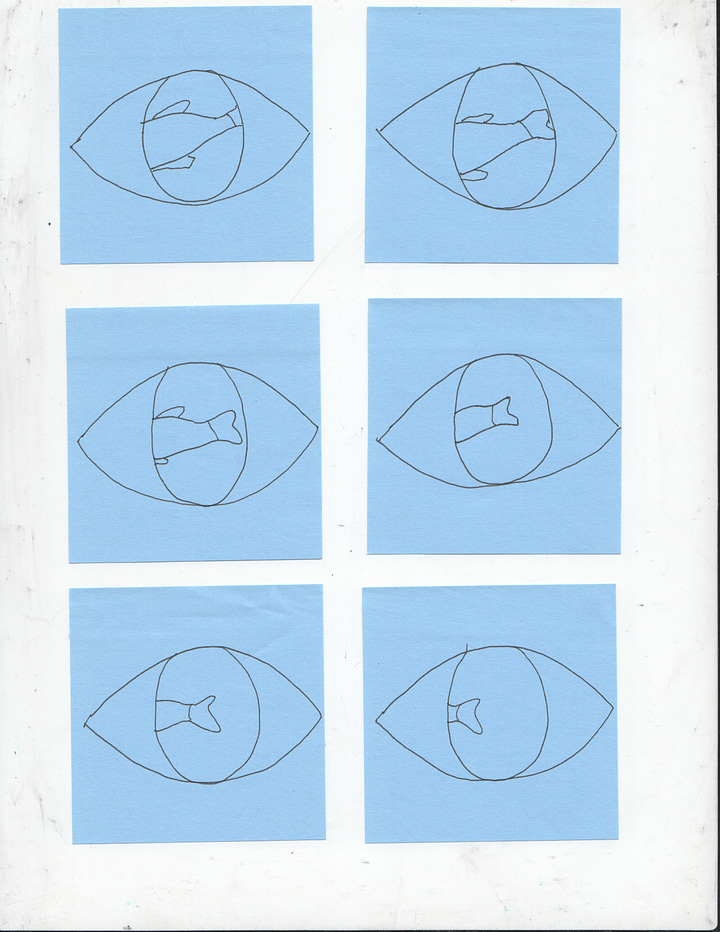
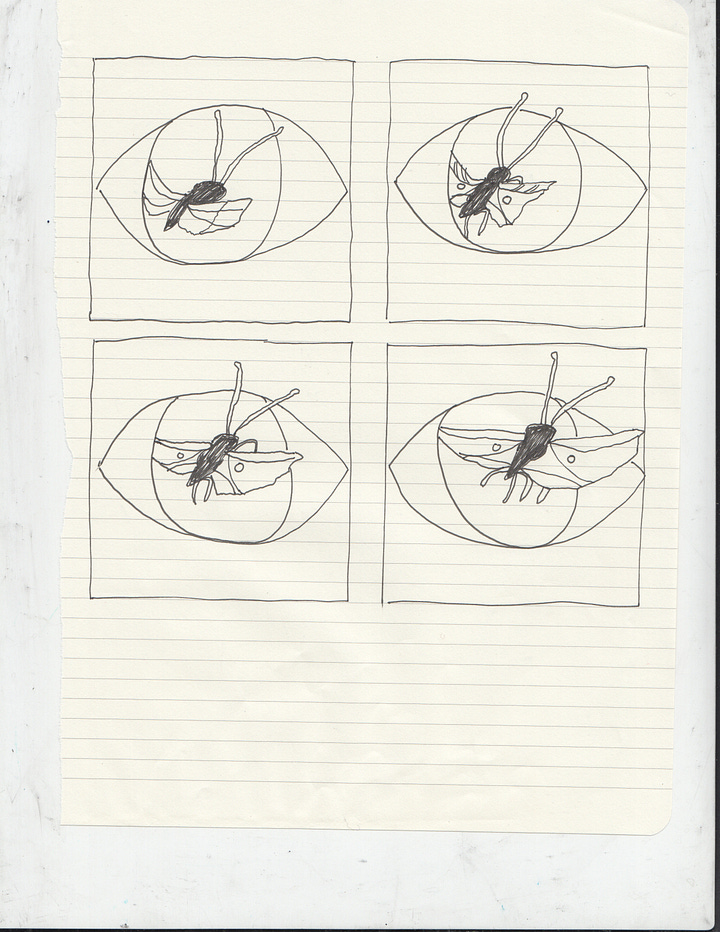

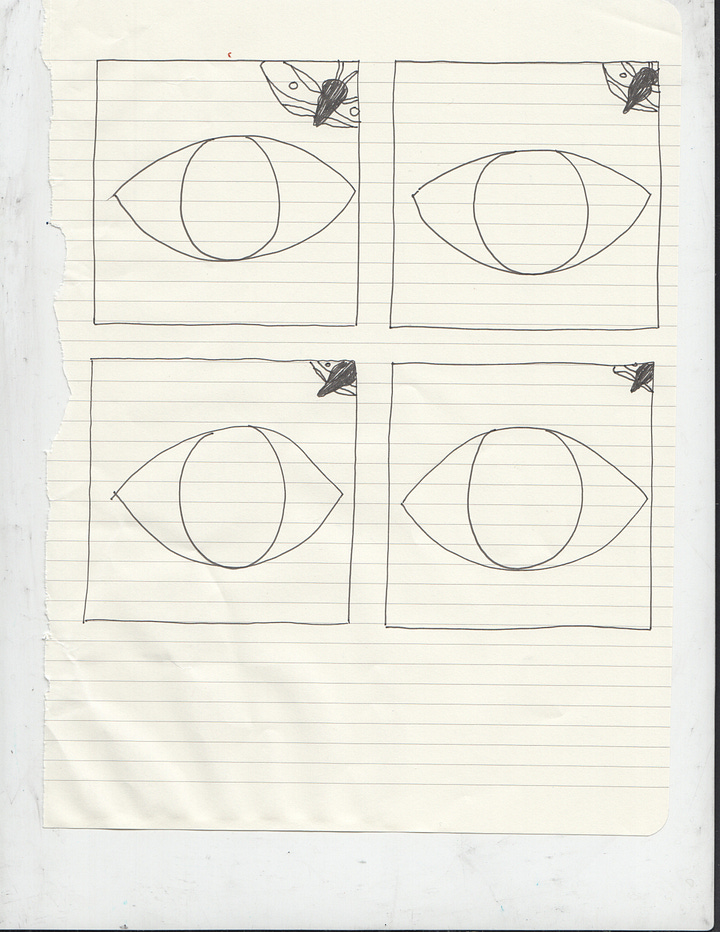







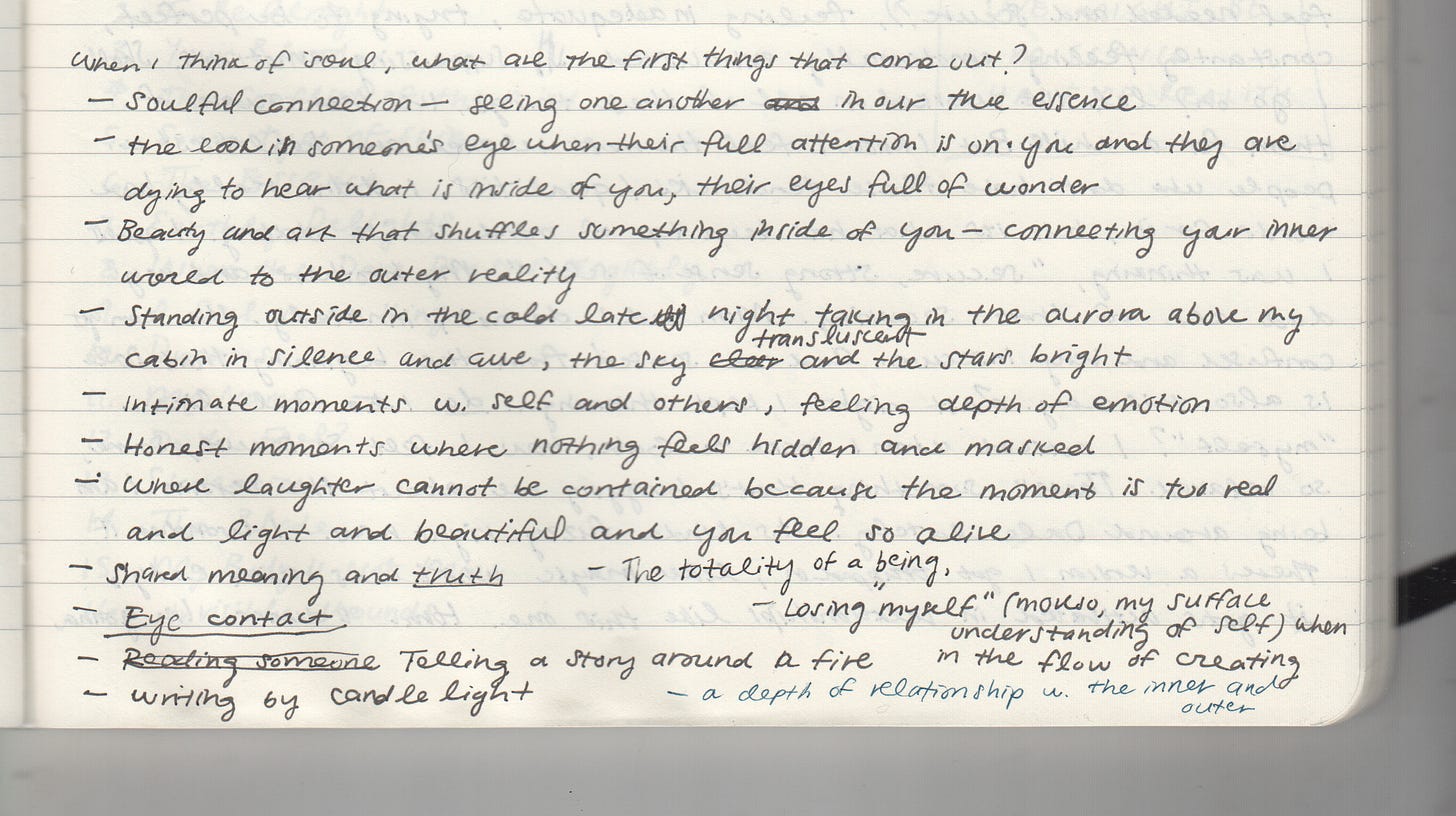
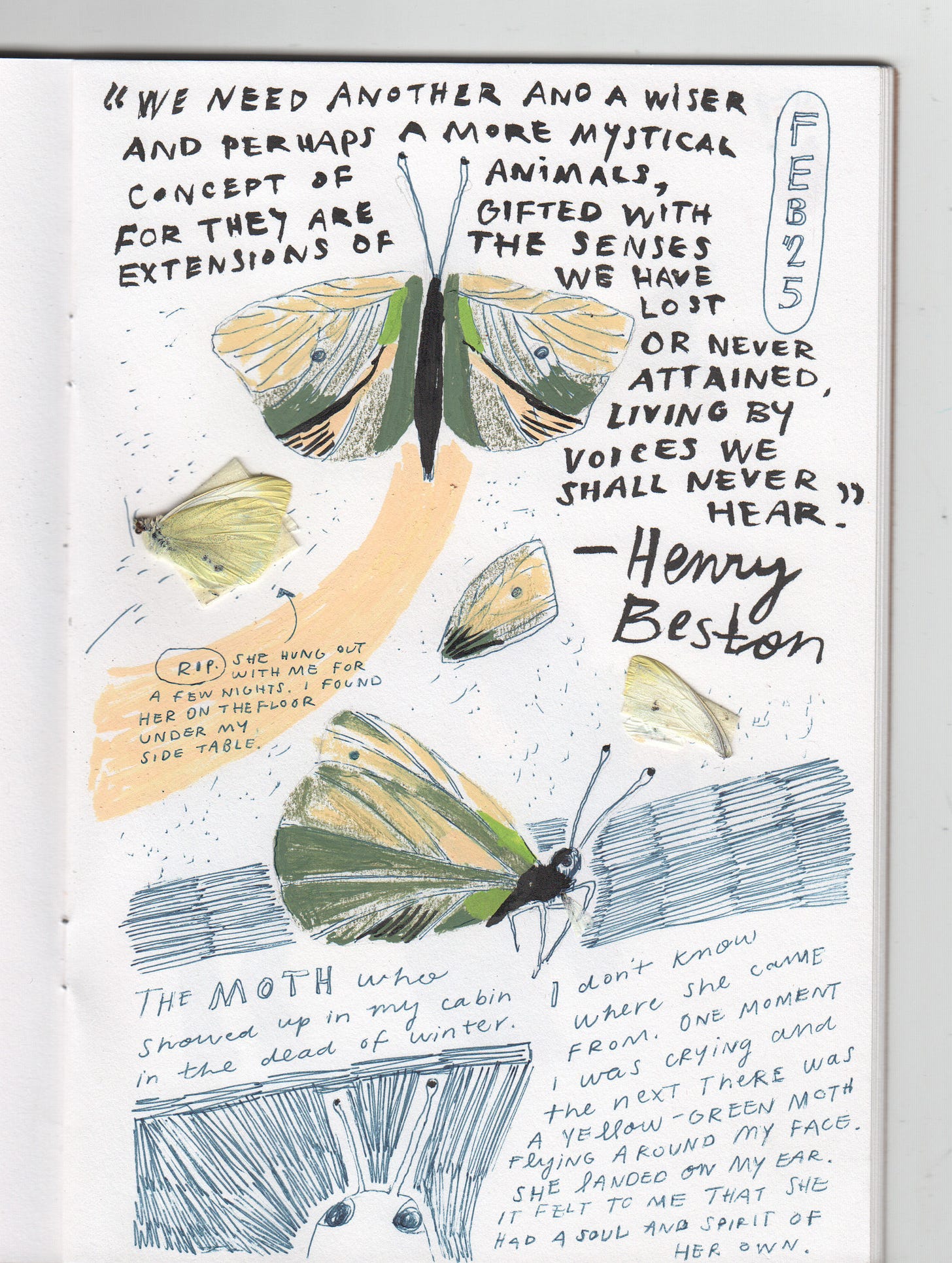
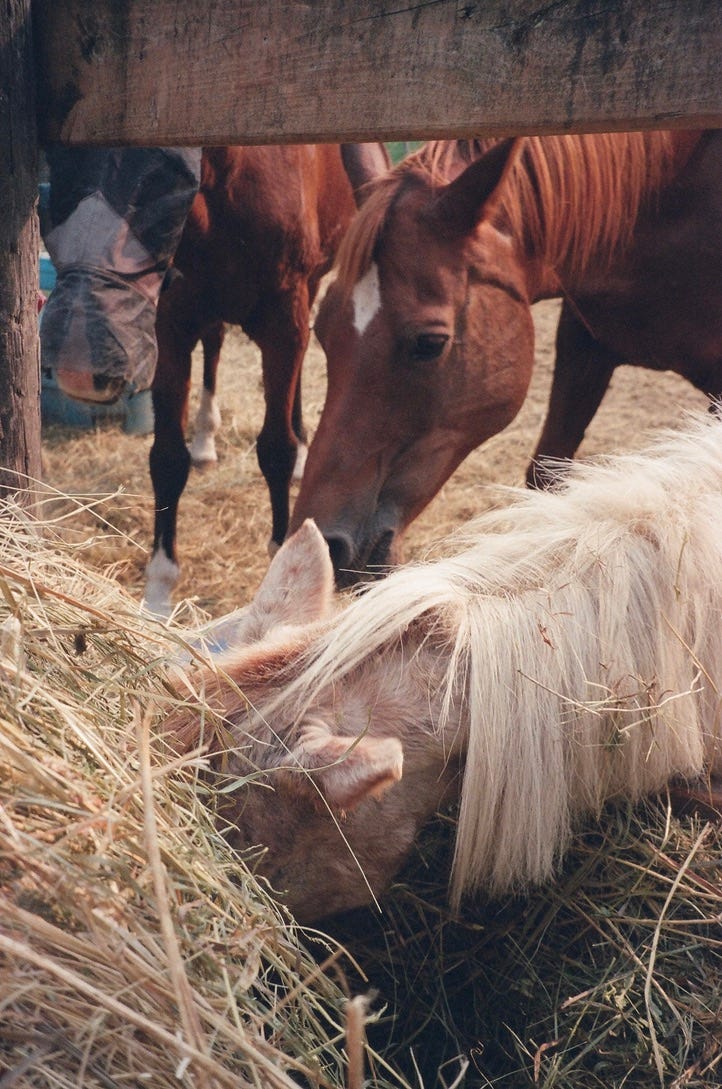
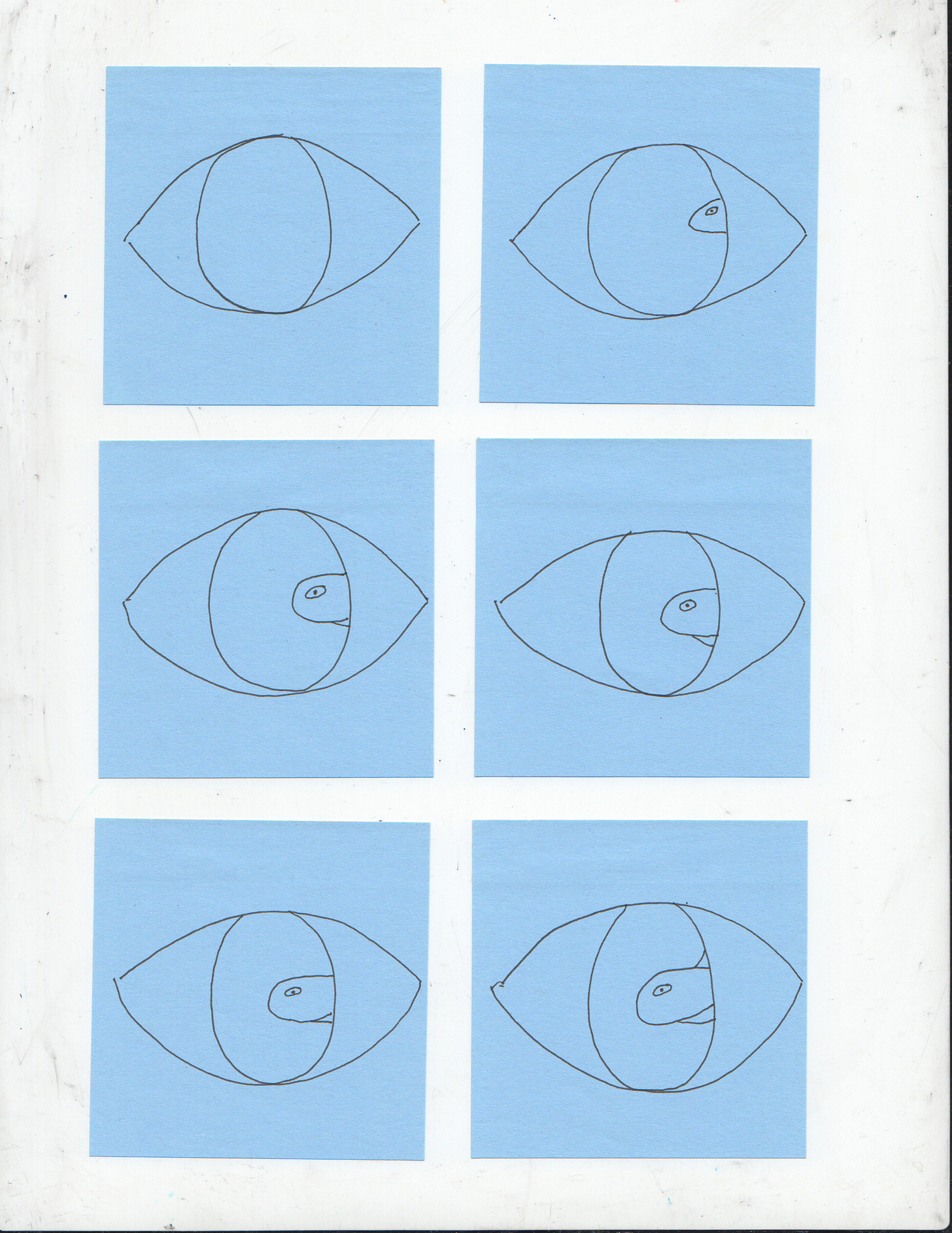
Really lovely seeing the fish swim by!
Beautiful